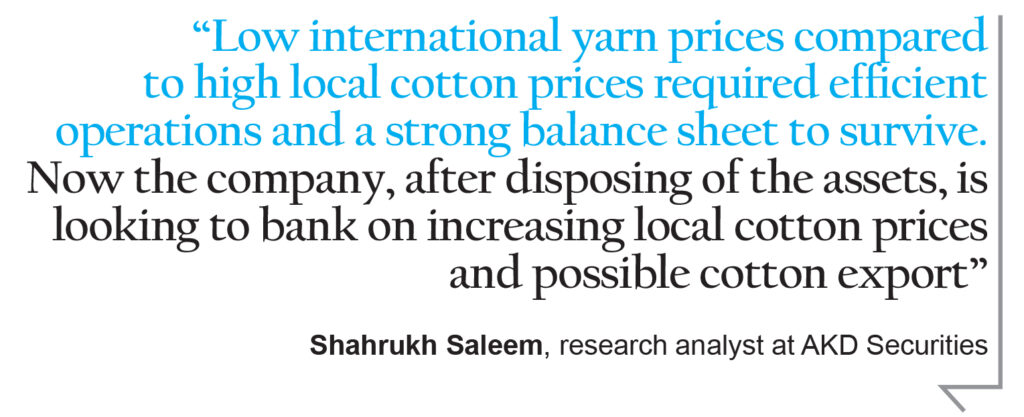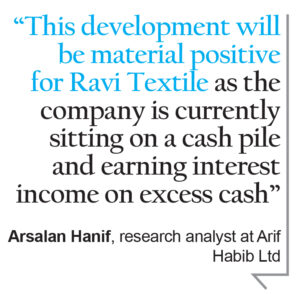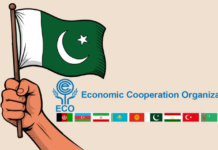Most companies try to move up the value chain: trying to enter the industry of the market they sell into. So, for instance, a textile spinning company that spins cotton yarn would move up the value chain by entering the weaving business, using that yarn to weave it into cloth. Ravi Textiles has decided to move in the opposite direction.
On August 17, Ravi Textiles Mills, with an office located in Multan and a mill located in Kasur district, announced it had signed a lease agreement for a ginning factory, located in Bahawalnagar. This is highly unusual: in textiles, historically, only spinning, weaving, and readymade garments companies (or some combination thereof) become publicly listed companies. Ginning factories, the vast majority of which are located in South Punjab, have almost never been publicly listed.
What is going on at Ravi Textiles Mills? Here is our primer.
If one calls Ravi Textile Mills number listed on Sher Shah Road, in Multan’s Cantonment area, one is greeted with an incredibly bemused receptionist. “Mill? Mill toh kab say nahin chal raha!” (“The mill? The mill hasn’t been running for a long time now!”)
And he would be right: Ravi Textiles Mills last operated in 2015, and has simply not functioned since. The company is a publicly listed company that was incorporated in 1984, and was designed to to manufacture and trade yarn. But it failed to do so, with the mill’s operations suspended between 2012 and 2014, and again between 2015 and 2019. If one looks at the ‘Six years at a Glance’ section of the company’s financials, there is a gaping blank where it should say ‘Yarn Sales’.
What happened? The company did not respond to requests for comment by the time of publishing, but we can still piece together some history. At the start of the 2010s, Ravi Textile Mills fortunes began to dip. As the company noted in its financials, it had a litany of problems: “volatile changes in prices of raw materials, disproportionate increase in price of yarn, volatile yarn market, bearish yarn market, increase in energy cost, scheduled and unscheduled extensive load shedding of electricity, and high mark up rates charged by banks.”

This resulted in a ‘squeezed liquidity’ position of the company, and the mill was not able to repay its short term borrowings and finance costs. Banks chose to not renew the credit facilities of the company, which expired in June 2011. Worse, the National Bank of Pakistan and Bank Alfalah instituted a recovery suit against the company in Lahore High Court.
And so management suspended operations at the mills, while it sorted out compromises with banks. Scraping together some directors’ loans, the company managed to resume operations of the mills in June 2015. This turned out to be very short lived, and it was suspended again in August 2015. Management at the time listed the same problems: “poor economic and market conditions for the spinning sector, high energy costs, high mark-up rates charged by banks and scarce availability of funds.”
It seems that Ravi Textile Mills was facing the full brunt of the crisis in the textile industry. In particular, the unscheduled extensive load shedding of electricity was particularly bothersome for the mill, and it was simply not viable to operate.
Obviously, this situation was untenable. So the company decided to sell its assets. In February 2019, it sold the mills located in Kasur to Waqas Rafique International – all except the vehicles – for Rs300 million. The money from the sale of the assets was then used to repay the company’s liabilities.
This sale was also reflected in the company’s financials ending June 30, 2019. After repaying off liabilities, the company had Rs151.9 million left in cash at the end of the year – compare that to the Rs1.5 million it had in cash at the start of the fiscal year. The company also made Rs113.3 million in ‘other’ income, which allowed it to make a profit of Rs 101.9 million in 2019, after a loss of Rs34.7 million the year prior.
Then, in October 2019, the company decided to lease a cotton ginning factory in Shujabaad, Multan, from Ali Cotton Industries. The plan was for the factory to be handed over before March 2020. This did not happen, as the Covid-19 pandemic hit and put a halt to all actions. Ali Cotton Industries said they could not repay their banks and creditors in March 2020, and therefore could not hand the factory over. Instead, it handed over the security deposit of Rs1 million, and Ravi started its search all over again.
And that leads us to the present day. Ravi Textile Mills finally found its perfect match, the Noman Cotton Ginning Pressing Factory in Bahawalnagar. An annual lease rent of Rs1.6 million was signed, and the factory is intended to be handed over to Ravi by the end of August, just in time for the ginning season that begins in September.

A ginning factory is technically a step back in the textile supply chain. Ginned cotton is the input for textile spinning companies, which is what Ravi Textile used to be. But does this represent a new chapter on Ravi Textile Mills history? Depends, according to Shahrukh Saleem, research analyst at AKD Securities, an investment bank. “The success of the venture will rest on how good the cotton crop is and the company’s liquidity again,” he said.
“Ravi Textile wasn’t operational since fiscal year 2015, which was attributed to tough business dynamics by the company. However, their limited liquidity didn’t help their cause either, in my opinion,” he further explained. “Low international yarn prices compared to high local cotton prices required efficient operations and a strong balance sheet to survive. Now the company, after disposing of the assets, is looking to bank on increasing local cotton prices and possible cotton export.”
Arsalan Hanif, research analyst at Arif Habib Ltd, another investment bank, took a more positive view: “This development will be material positive for Ravi Textile as the company is currently sitting on a cash pile and earning interest income on excess cash.”
For Hanif, the new lease agreement between Ravi Textile and Noman Cotton Ginning Factory represents the start of a ‘new journey’. He even went so far as to say the company will be able to generate earnings through business operations, which will help the company to leave the PSX’s ‘defaulter’ list.

























